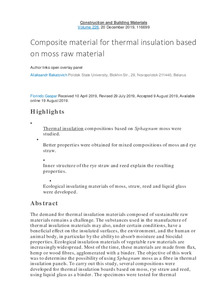Please use this identifier to cite or link to this item:
https://elib.psu.by/handle/123456789/25219Full metadata record
| DC Field | Value | Language |
|---|---|---|
| dc.contributor.author | Bakatovich, A. | - |
| dc.contributor.author | Gaspar, F. | - |
| dc.date.accessioned | 2020-06-30T05:43:41Z | - |
| dc.date.available | 2020-06-30T05:43:41Z | - |
| dc.date.issued | 2019 | - |
| dc.identifier.citation | Aliaksandr Bakatovich, Florindo Gaspar, Composite material for thermal insulation based on moss raw material, Construction and Building Materials, Volume 228, 2019 | ru_RU |
| dc.identifier.uri | https://elib.psu.by/handle/123456789/25219 | - |
| dc.description.abstract | The demand for thermal insulation materials composed of sustainable raw materials remains a challenge. The substances used in the manufacture of thermal insulation materials may also, under certain conditions, have a beneficial effect on the insulated surfaces, the environment, and the human or animal body, in particular by the ability to absorb moisture and biocidal properties. Ecological insulation materials of vegetable raw materials are increasingly widespread. Most of the time, these materials are made from flax, hemp or wood fibres, agglomerated with a binder. The objective of this work was to determine the possibility of using Sphagnum moss as a fibre in thermal insulation panels. To carry out this study, several compositions were developed for thermal insulation boards based on moss, rye straw and reed, using liquid glass as a binder. The specimens were tested for thermal conductivity, and strength to compression and bending. Best results were achieved on panels of moss and straw with thermal conductivity of 0.044–0.046 W/(m.K) at a density of 156–190 kg/m3, without shrinking during drying and a compression strength between 0.20 and 0.21 MPa. Electronic microscopy of rye straw and reed stems made it possible to examine the presence of outer and inner parts in the structure, which affect the thermal and strength characteristics. With the use of natural raw materials from plants and agricultural production residues, an effective and ecologically safe rigid board insulation was obtained, which has biocidal properties and has no analogues in the market for the construction of thermal insulation materials. | ru_RU |
| dc.language.iso | en | ru_RU |
| dc.publisher | Elsevier | - |
| dc.subject | Moss | ru_RU |
| dc.subject | Sphagnum | ru_RU |
| dc.subject | Thermal insulating | ru_RU |
| dc.subject | Rye straw | ru_RU |
| dc.subject | Reed | ru_RU |
| dc.subject | Liquid glass | ru_RU |
| dc.title | Composite material for thermal insulation based on moss raw material | ru_RU |
| dc.type | Article | ru_RU |
| dc.identifier.doi | 10.1016/j.conbuildmat.2019.116699 | - |
| Appears in Collections: | Публикации в Scopus и Web of Science | |
Files in This Item:
| File | Description | Size | Format | |
|---|---|---|---|---|
| Bakatovich_Composite_material_for_thermal_insulation_based_on_moss_raw_materia.pdf | 62.15 kB | Adobe PDF |  View/Open |
Items in DSpace are protected by copyright, with all rights reserved, unless otherwise indicated.